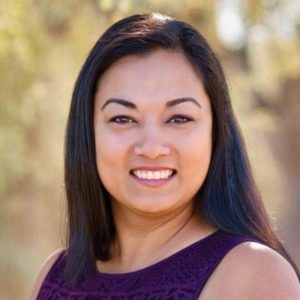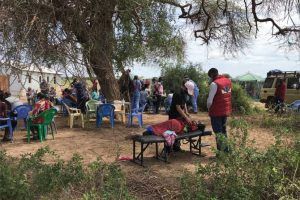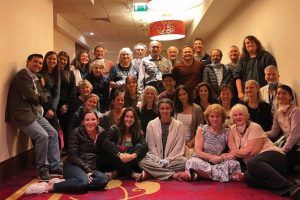We care for people and our communities despite the barriers. We all chose this profession, and in the face of obstacles, we find compassion in caring for our patients regardless of what they look like or what they believe.
There’s a lot going on in our world right now. The challenges of the COVID pandemic have changed, but the strain it has caused and continues to cause is palpable to all of us in varying degrees. Like many of you, I have spent considerable time reflecting on ways to move forward, focusing on how to provide excellent care for patients and how to thrive personally and professionally. This has been no easy feat.
I was recently sitting with a patient of advanced age who had just been discharged from the hospital for injuries sustained from yet another fall. While reviewing her case – vitals, labs, imaging studies, preventative screenings, performing a clinical evaluation, meeting meaningful use and documentation requirements, examining the criteria for ordering further diagnostic testing or prescribing a medication or referral or procedure to treat or manage her medical conditions in a fashion acceptable to the insurer – she asked how I was doing. Unlike my usual answer of “Fine,” I unexpectedly answered, “It’s been rough,” guiltily followed by, “not as rough as what you’ve been through, though.” She replied, “I feel fine. You look terrible.” I laughed, “How do you know? I’m wearing a mask and safety goggles.” She rolled her eyes and said,
“I can tell.”
I told her not to worry about me, negotiated whether she would use her walker or let the home health physical therapist into her home this time so she could improve her balance, and gave her a list of proteins she might tolerate so she could recover, all the while weighing the merits of hair dye and cosmetics. My barely middle-aged body ached with fatigue at these thoughts.
My next patient was a healthy but worried young woman who needed reassurance that despite what her smartwatch or the internet said, she did not have atrial fibrillation or sleep apnea. I gently and cautiously guided her to consider that she may, possibly, potentially, probably, have some anxiety. She said, “I think I’m just anxious,” as I tried to hide my sigh of relief that my motivational interviewing skills hadn’t fallen flat, and I proceeded to address her anxiety.
As my day went on, I dispelled some rumors about microchips in the COVID vaccines to multiple individuals glued to their smartphones while listing the side effects that had actually been reported to the CDC. I thanked a patient for recommending a book of conspiracy theories that he found educational. I delicately asked an adolescent about a bruise on her thigh, holding my breath and hoping the aggressor was her desk or a pet, not a person. I hoped that if it was a person, she trusted me enough to tell me, and if she did, I would be able to help her. Thankfully, she insisted it was her car door, and I believed her. I explained to another patient that we couldn’t check all the vitamin levels or all the hormones or screen for all the cancers but did have screening tools like mammograms, colonoscopies, and pap smears, which were quickly declined.
But this was not an exceptional day. It was just another day at the office. Is this what I signed up for? What I spent my best decade of youth and vigor on? What I sacrificed relationships, passed up adventures, mounted massive debt, and shed tears for? This is not what I expected, but the answer is a resounding YES. I chose all those things, and I hadn’t fully appreciated that my real job is to make each person who enters my clinic feel valued. My job isn’t to impose my beliefs; it is to determine what each patient finds meaningful; how they define good health and well-being, to provide the information they need to make educated decisions to get them to their goals, to build a relationship, so they find my advice relevant and trustworthy, and always to treat each person with compassion. I endure the cumbersome EMR and requirements to “provide quality care for our patients,” because I don’t know of a better way to connect so personally with another human being, to make them feel heard and respected, and guide them through the incredibly confusing maze that is our healthcare system.
This work can be exhausting, but as family physicians, this is what we do. We care for people and our communities despite the barriers. We all chose this profession, and in the face of obstacles, we find compassion in caring for our patients regardless of what they look like or what they believe. As family medicine physicians in Utah, we are all facing the challenges of a physician shortage, of a growing and changing population, of deciphering and following new laws instituted by our state and federal governments, all while facing decreasing reimbursement from CMS and private payors and increasing pressure to meet various metrics.
We’re all in this together, so let’s make some changes. This year, my goal as president of the UAFP board of directors is to better connect us as family physicians so we can talk openly about where we are and where we should go from here, what is important to us, and how we can support each other. We take such good care of our patients and advocate for them relentlessly, so let’s use that compassion to care for each other, to encourage and support future generations of family physicians because even on our worst days, the work we do is really immeasurable and irreplaceable.
The UAFP is the largest single specialty organization in Utah, with a membership of 1,200 attendings, residents, and medical students interested in pursuing family medicine. Our members are integrated into local and state health departments, in each of the three medical schools, in each healthcare system, and the state legislature. Our numbers give us clout with our local governments, employers, and payors. Let’s use this advantage to strengthen our specialty and improve our daily lives.
Understanding that time is a precious and limited resource, UAFP provides several ways to connect with your peers throughout the year. Whether you are interested in spending the weekend learning and skiing at CME & Ski, attending a Bees game or going to Hogle Zoo with your family and your fellow family physicians, being a part of Utah’s lawmaking process, participating in a service project, or joining a committee – UAFP has several ways you can engage with your colleagues.
We always hope to hear from our rural physicians, currently underrepresented on the board, to present topics of interest to you, and provide suggestions, recommendations, and feedback so we can better serve you and your communities. We are also developing a new committee on Equity, Diversity and Inclusion to connect those interested in this area. We are planning quarterly in-person get-togethers hosted by one of our physician members in their home to provide a safe and confidential space to express our frustrations, look for solutions, and provide camaraderie.
Our dedicated CEO/Executive Director, Maryann Martindale, and Associate Director, Barbara Muñoz, are committed to serving our members, our communities and advancing our profession. They represent our views and our voice. Please reach out to them with your ideas.








